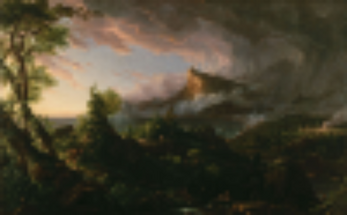
The Empire, of course
A downloadable game
Thomas Cole’s master work The Course of Empire (1834-36) is a series of five paintings that depict the construction and destruction of an imaginary civilization, though Cole’s imagination borrows heavily from ancient Rome and Greece. The five paintings begin with a pastoral scene and end again with a similar landscape, now marked by architectural ruins left behind from the civilization that ravaged it. Cole makes no effort to conceal his contempt here. He and the rest of his cohort in the Hudson River School were skilled in weaponizing the sublime, sharpening the American landscape into an arrow.
What is crucial in this particular series is the narrative. The romantic landscapes that came out of nineteenth century America all imply a narrative of dominance and conquest, one that The Course of Empire makes explicit. It distinguishes the American style of conquest from a history of empire; the new mode of annihilation is under the spell of the sublime.
The twenty-first century sublime has been concentrated into objects as the environment that used to do the trick disappears. Natural resources compose the objects that provide us with the image of the sublime, but somewhere in this transference the sublime mutated. The landscapes were dematerialized and reconstituted with pixels, but they’re saturated and blurry now, still determined to scramble the senses in a lower fidelity.
This game uses images and three dimensional objects to compose a version of the landscapes Cole imagined. By merging digital objects from two eras of game technology, the time between such technologies is collapsed and an internal economy of the sublime is constructed. In this economy, the sublime object is stripped of its aesthetic power and value in a non-hierarchical space: the old absorbs and disarms the new.
Agency is valuable in the game world and it is constantly being given and taken away, either showing you something or giving you permission to do something. This slip into and out of omniscience is represented in The Empire, of course by a sudden switch from first person to third person perspective, which reveals the identity of the player character: a mountain. The player has the ability to control the terrain they were trampling before, but their mobility in this state is limited.
The player is able to find various texts in the game, including excerpts from lectures and letters written by Thomas Cole. The act of discovering is always part of the Hudson River School narrative. The sublime exists only when you behold it, between fiction and truth; the sublime must have potential to inspire a spiritual imperative to conquer and it’s truth is suppressed in favor of that imperative.
The game can be played forever, theoretically. One scene feeds into another, without beginning or end, to mock the cyclical time of Cole’s master work and transform his poetics into frustration. The jeremiad he rendered in paint is now imagined through pixels, to the tune of a computer’s hum, hard at work.
| Status | Released |
| Author | the_empire |

Comments
Log in with itch.io to leave a comment.